Nevada juvenile court handles most cases involving minors (under 18) accused of breaking the law. In serious cases, however, juvenile court judges may “certify” the child to be prosecuted and tried as an adult in criminal court.
Obviously, we do everything in our power to avoid having juvenile defendants certified as adults for three reasons:
- Juvenile court is geared towards rehabilitation, whereas criminal court places a greater emphasis on punishment;
- Having a juvenile delinquency on your record is less damaging than having a criminal conviction; and
- Most juvenile records get automatically sealed at age 21, whereas you have to apply to seal criminal records, and some have lengthy wait times.
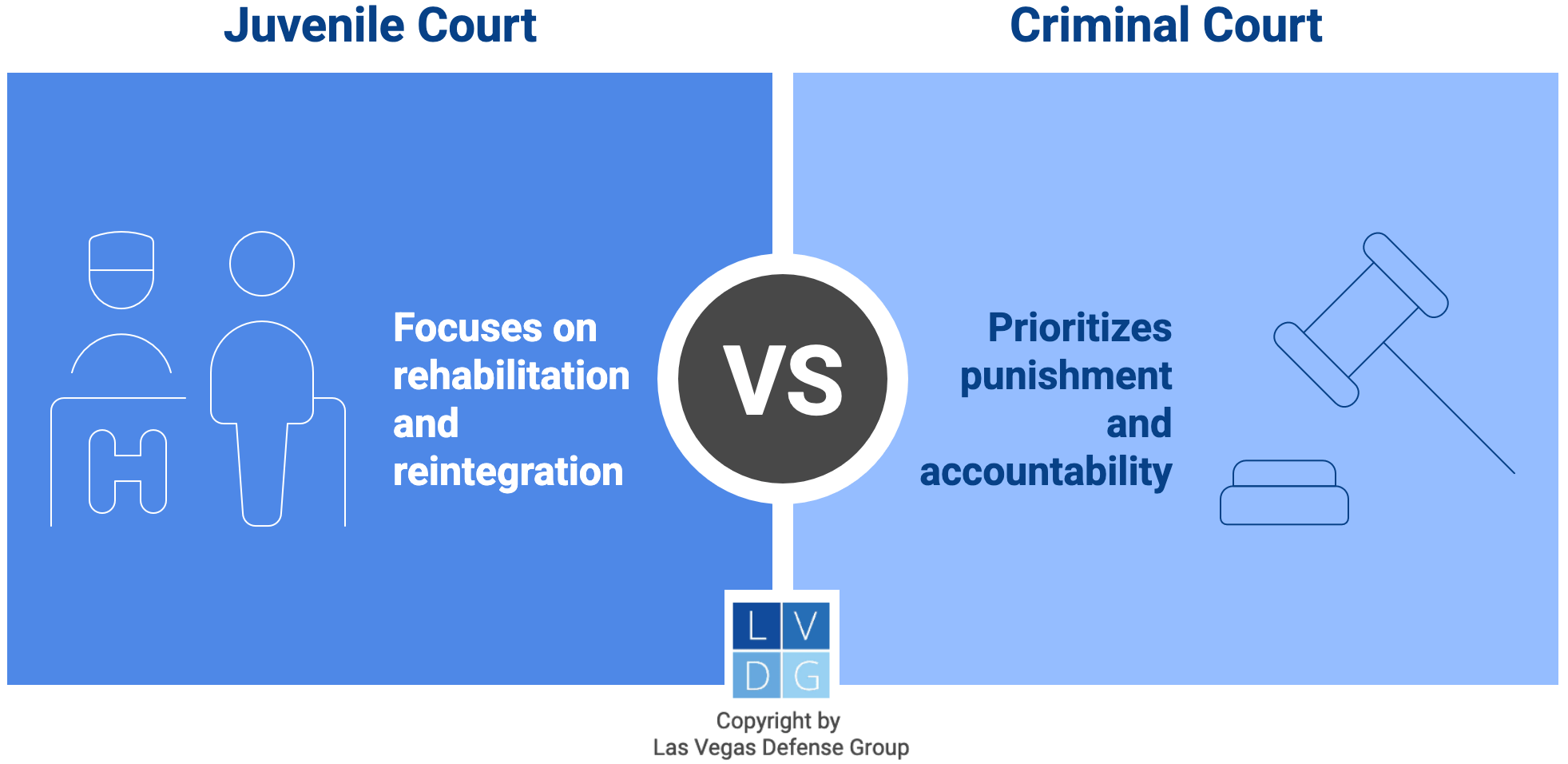
Here at Las Vegas Defense Group, we have represented countless young people who had brushes with the law and faced being tried as adults. In our experience, early intervention and negotiations with the prosecution are key to preventing certification.
In this article, our Las Vegas juvenile crimes attorneys explain how certification works and how we may challenge it.
1. Certification Process
For your child to be tried as an adult in Nevada, first, the prosecutor makes a motion to the court requesting that your child be certified for transfer to criminal court. Following an investigation, the court holds a hearing where we would zealously argue against certification. Finally, the judge uses their discretion to make a decision.1
Juveniles can be tried as adults in two circumstances:
- the child is 13 to 15 and accused of murder or attempted murder, or
- the child is at least 14 and accused of a delinquency charge that would be a felony if committed by an adult.
When considering the prosecutor’s motion to certify a minor, juvenile court judges take various considerations into account. These include:
- the seriousness of the crime,
- the minor’s criminal history,
- the minor’s show of remorse,
- whether the minor has a condition that prevents them from understanding the consequences of their actions, and
- whether the minor would be better served by the juvenile justice system.
Mandatory Certification
There is one scenario where judges are required to certify your child as an adult: This is when your child is 16 or 17 and was accused of either:
- sexual assault (rape) involving the use or threatened use of force or violence against the victim or
- an offense or attempted offense involving the use or threatened use of a firearm.
However, we can stop this “mandatory certification” if we can prove to the juvenile court judge (by clear and convincing evidence) that:
- your child cannot understand the situation due to mental incompetence; or
- your child has substance abuse or behavioral problems that may be treated through the juvenile court system.2
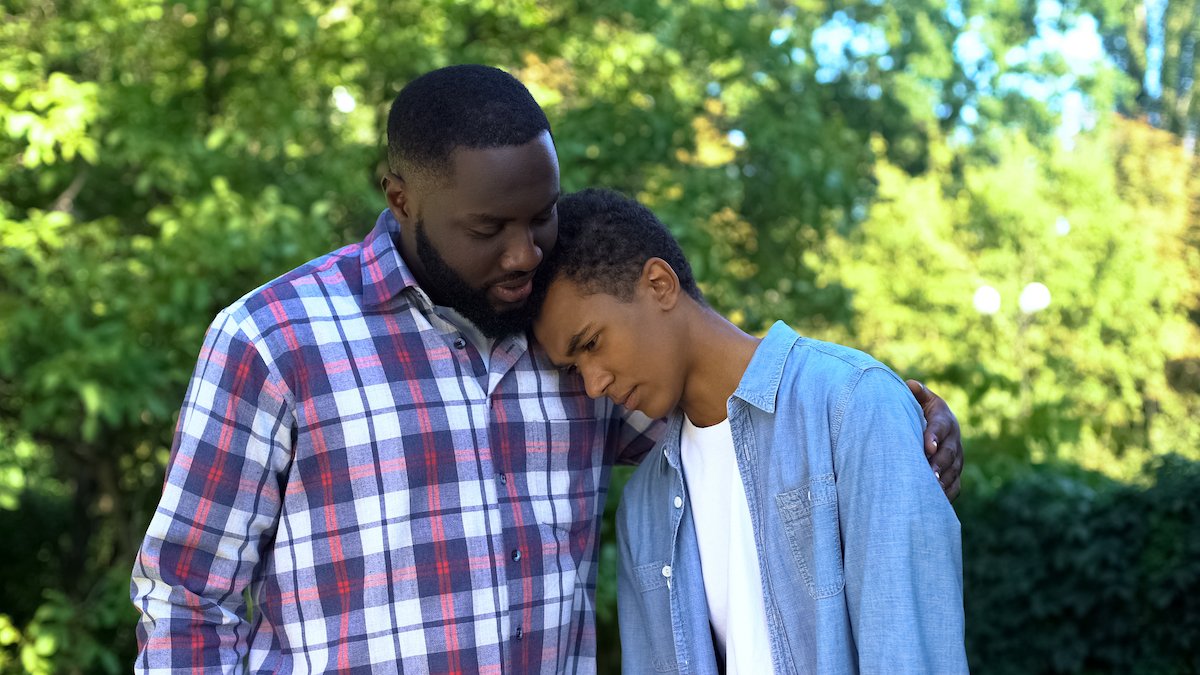
Judges take many factors into account when deciding whether to certify eligible minors as adults.
2. Criminal Court Jurisdiction
There are six severe cases where the Nevada criminal court – and not the juvenile court – has jurisdiction over your child from the start. There is no need to certify them because the juvenile court never had jurisdiction over them.
The first case is when your child was previously convicted of a criminal offense. Once your child has a criminal conviction on their record, all future cases are handled in criminal court.
The following four cases concern minors who were 16 or 17 years old when they allegedly committed either:
- murder or attempted murder; or
- sexual assault or attempted sexual assault involving the use (or threatened use) of force or violence against the victim, and they have a prior delinquency that would be a felony had an adult committed it; or
- an offense or attempted offense involving the use or threatened use of a firearm, and they have a prior delinquency that would be a felony had an adult committed it; or
- a category A or B felony, but either:
- the police did not identify your child as the suspect until they reached 21 years old, or
- the police did not identity and charge your child until they reached 20 years old and 3 months.
The final case is when your child was accused of a felony that resulted in death or substantial bodily harm to the victim, and the felony was committed on the property of a public or private school when pupils or employees of the school were present or may have been present. In addition:
- it must have been at an activity sponsored by a public or private school or on a school bus while the bus was engaged in its official duties, and
- your child must have intended to create a great risk of death or substantial bodily harm to more than one person using a weapon, device or course of action that would normally be hazardous to the lives of more than one person.
Otherwise, all children under 18 who get arrested start in juvenile court. As discussed in the prior section, there are situations where the judge has the discretion to certify your child as adults, and there are situations where it is presumed that your child will be certified as an adult.3

Nevada juvenile court judges have the discretion to certify certain minors as adults.
3. Multiple Charges
If one of your child’s charges gets transferred from juvenile court to criminal court in Nevada, the rest of your child’s charges will transfer as well. This way, all the charges are handled in just one court.
Example: Susan is 17 when she offers a john to have sex for $200. While in their hotel room, Susan steals his Rolex. Susan gets arrested and goes to Juvie Court, where she gets charged with the misdemeanor of soliciting prostitution as well as the felony of grand larceny.
Because of the felony and Susan’s age, the judge has the discretion to certify her as an adult to be tried in criminal court. If the judge decides to transfer her, the solicitation court case transfers as well because both charges arose out of the same case.
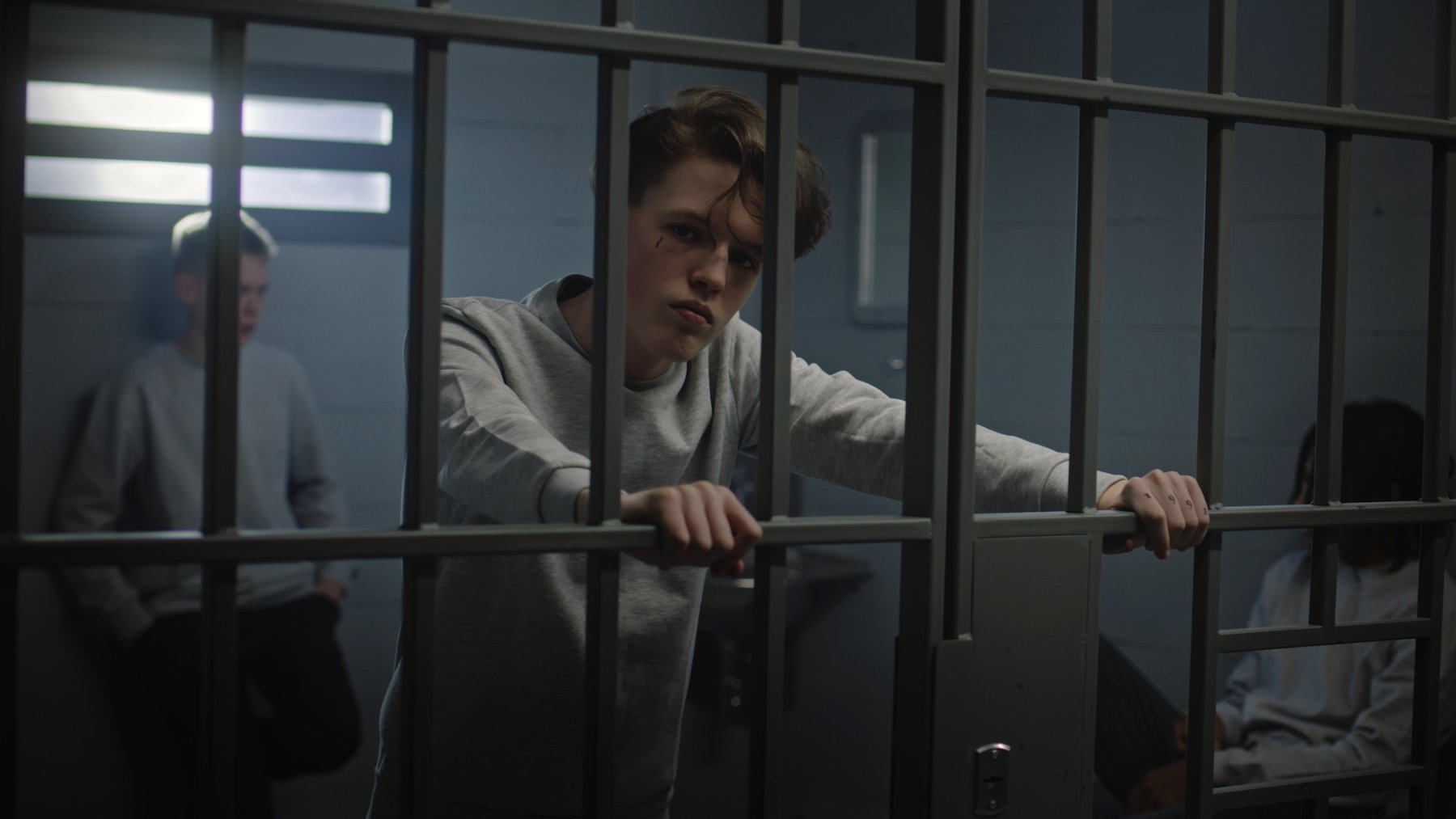
Detention is a rare punishment in juvenile cases.
4. Reversing Certification
If a juvenile court judge certifies your child as an adult in Nevada, we can file a petition to have the case transferred back from criminal court to juvenile court. To “reverse” certification, we would have to show there are “exceptional circumstances” to justify it. Examples include:
- The criminal court prosecutors or judge in your child’s case committed misconduct that prejudiced their right to a fair trial (“judicial error” or “prosecutorial misconduct”); and/or
- Your child’s original attorney or public defender did not provide competent representation (“ineffective assistance of counsel“).4
In addition, we would argue that your child’s needs would be best served in the juvenile justice system and that subjecting your child to the adult criminal justice system at such a young age not only hurts their long-term prospects but also fails to serve the public good.
Remember that your child can never be transferred from criminal court to juvenile court if any one of the six exceptions listed above in section 2 applies. In those cases, the criminal court has “exclusive and original” jurisdiction over your child’s case even though they were under 18 at the time of the alleged offense.
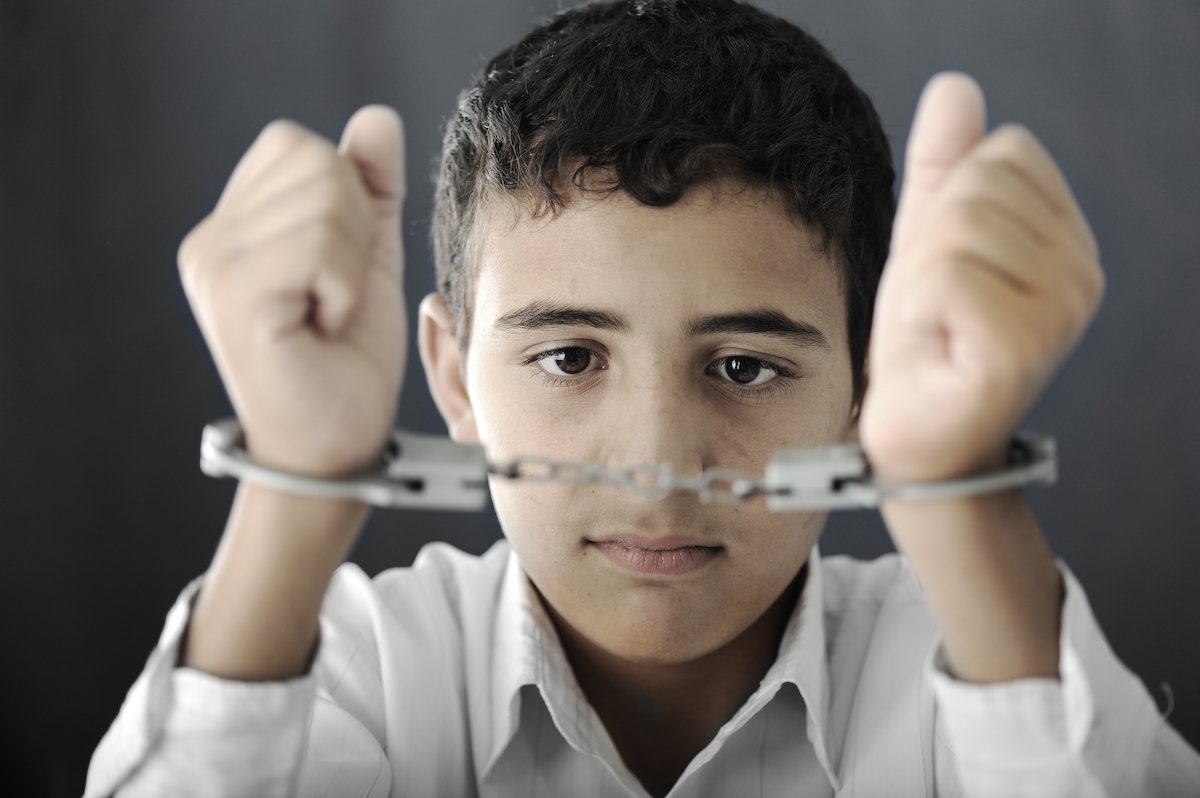
In certain serious cases, criminal court has automatic original jurisdiction over a child’s case.
5. Penalties
Both juvenile court and criminal court in Nevada impose similar types of penalties, including:
- detention,
- counseling,
- rehab,
- community service,
- fines/restitution, and
- driver’s license revocations.
If your child is found delinquent in juvenile court, the worst-case scenario is that they are sentenced to a term in juvenile hall. Though if they are certified and convicted as an adult, then your child faces incarceration in county jail or state prison.
In practice, juvenile court judges rarely sentence children to detention; or if they do, the sentence is no longer than a few weeks or months. In criminal court, however, mandatory incarceration is common for many crimes, and sometimes the sentence can be several years.
Note that if your minor child is convicted of a crime in adult criminal court, their youth gives them one advantage: The judge has the option of reducing their mandatory minimum sentence by 35%.5
Example: Seventeen-year-old Ben is convicted in criminal court for burglary with a deadly weapon, which carries a mandatory minimum of two years in prison. Because Ben was a juvenile when he committed the burglary, the judge can sentence him to only 1.3 years in prison instead.

Juvenile penalties are less severe than criminal penalties.
6. Record Seals
In Nevada, most juvenile court records get sealed automatically once your child turns 21. Having a “clean record” when your child reaches adulthood will greatly increase their prospects for employment, education, housing, professional licenses, and loans.
In contrast, adult criminal records usually cannot be sealed until five or 10 years after the case closes, and some convictions stay on your child’s record forever. So if your child’s juvenile case gets transferred to criminal court – and then your child gets convicted – your child may have a much harder time getting ahead in life with a criminal record haunting them.6
This criminal record issue is one of the primary reasons we work so hard to keep cases in juvenile court: Our goal is not just to receive leniency in penalties, but also to minimize any long-term consequences.
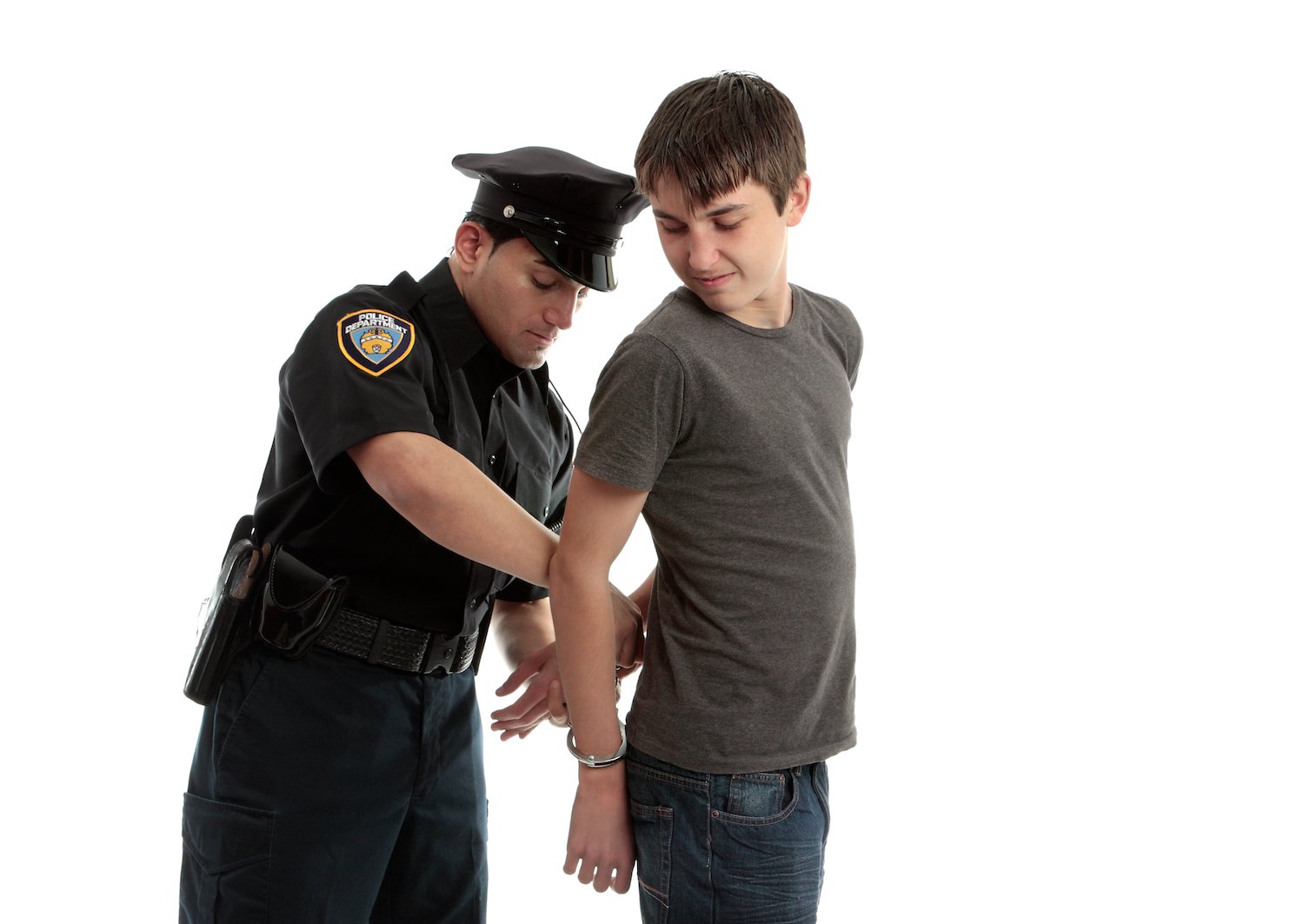
In some cases, certified cases can be transferred back to juvenile court.
7. Juvenile v. Criminal Courts
Juvenile court and criminal court use different words to mean similar things, so it is easy to get confused. The following chart outlines the key terms in juvenile court and their equivalent in criminal court in Nevada.
| Juvenile Court Term | Criminal Court Term |
| Delinquent act | Criminal act |
| Contested hearing | Trial |
| Admit or deny a charge | Plead guilty or not guilty to a charge |
| Adjudicated delinquent | Found guilty (convicted) |
| Disposition | Sentence |
Juvenile court and criminal court provide defendants with many of the same rights, such as the right to an attorney (counsel). However, there are no jury trials in juvenile court – only bench trials: The juvenile court judge determines whether the child is delinquent and how to punish them.
In addition, Nevada has a Juvenile Justice Bill of Rights that provides incarcerated children with the following protections:
- Fair and equal access to services, care, and treatment.
- Respect and dignity with no intentional humiliation.
- Appropriate and state-standardized education while in custody.
- Sufficient and healthy food.
- Basic necessities, including clothing, shelter, and hygiene products.
- Medical care, including behavioral health care.7

A purpose of juvenile court is to hopefully keep minors from re-offending as adults.
Frequently Asked Questions
At what age can a juvenile be tried as an adult in Nevada?
In Nevada, juveniles can be tried as adults if they are 13-15 years old and accused of murder/attempted murder, or if they are at least 14 and charged with a felony-level offense. Mandatory adult certification applies to those 16-17 years old accused of violent sexual assault or firearm-related offenses.
What happens to my child’s juvenile record when they turn 21?
Most juvenile court records in Nevada are automatically sealed when your child turns 21. However, if your child was tried and convicted as an adult, the record typically cannot be sealed until 5 to 10 years after the case closes, and some convictions may remain on their record permanently.
How can I prevent my child from being tried as an adult?
Early intervention and negotiations with prosecutors are key. Your attorney can argue against certification by highlighting factors such as the child’s lack of criminal history, a show of remorse, and the potential for rehabilitation through the juvenile system rather than the adult court.
What rights does my child have in juvenile detention?
Under Nevada’s Juvenile Justice Bill of Rights, detained juveniles have rights to fair access to services, respectful treatment, standardized education, sufficient food, necessities, medical care, including
- mental health services, and
- protection from intentional humiliation.
Additional Resources
For additional information on juvenile justice laws, refer to the following:
- Clark County Juvenile Detention Center – Our information page about Las Vegas Juvie Hall.
- Eighth Judicial District Court Juvenile Court – Official page of the Juvenile Court in Clark County (including Las Vegas).
- Nevada Juvenile Justice Services – Serves youths committed for delinquent behavior or mental illness.
- Nevada Child Welfare Services – Assesses the needs of children and their families. Helps provide shelter, foster care, and counseling.
- Trying Juveniles as Adults: An Analysis of State Transfer Laws and Reporting – Article by the Office of Juvenile Justice and Delinquency Prevention (OJJDP).
Legal References
- See In re. Eric (2006) 123 Nev. 26. In Re: B.J.W.-A. C/W 84276 (2023) 522 P.3d 814. In re. D.C., Jr. (2024) 46 P.3d 810. NRS 62B.390 – Certification of child for criminal proceedings as adult:
1. Except as otherwise provided in subsection 2 and NRS 62B.400, upon a motion by the district attorney and after a full investigation, the juvenile court may certify a child for proper criminal proceedings as an adult to any court that would have jurisdiction to try the offense if committed by an adult, if the child:
(a) Except as otherwise provided in paragraph (b), is charged with an offense that would have been a felony if committed by an adult and was 14 years of age or older at the time the child allegedly committed the offense; or
(b) Is charged with murder or attempted murder and was 13 years of age or older when the murder or attempted murder was committed.
2. Except as otherwise provided in subsection 3, upon a motion by the district attorney and after a full investigation, the juvenile court shall certify a child for proper criminal proceedings as an adult to any court that would have jurisdiction to try the offense if committed by an adult, if the child:
(a) Is charged with:
(1) A sexual assault involving the use or threatened use of force or violence against the victim; or
(2) An offense or attempted offense involving the use or threatened use of a firearm; and
(b) Was 16 years of age or older at the time the child allegedly committed the offense.
3. The juvenile court shall not certify a child for criminal proceedings as an adult pursuant to subsection 2 if the juvenile court specifically finds by clear and convincing evidence that:
(a) The child is developmentally or mentally incompetent to understand the situation and the proceedings of the court or to aid the child’s attorney in those proceedings; or
(b) The child has a substance use disorder or emotional or behavioral problems and the substance use disorder or emotional or behavioral problems may be appropriately treated through the jurisdiction of the juvenile court.
4. If a child is certified for criminal proceedings as an adult pursuant to subsection 1 or 2, the juvenile court shall also certify the child for criminal proceedings as an adult for any other related offense arising out of the same facts as the offense for which the child was certified, regardless of the nature of the related offense.
5. If a child has been certified for criminal proceedings as an adult pursuant to subsection 1 or 2 and the child’s case has been transferred out of the juvenile court:
(a) The court to which the case has been transferred has original jurisdiction over the child;
(b) The child may petition for transfer of the case back to the juvenile court only upon a showing of exceptional circumstances; and
(c) If the child’s case is transferred back to the juvenile court, the juvenile court shall determine whether the exceptional circumstances warrant accepting jurisdiction.
- Same. See Thomas R. v. Juvenile Div., Eighth Judicial Dist. Court ex rel. County of Clark (1983) 99 Nev. 427.
- NRS 62B.330. See William S. v. State (In re William S.) (2006) 122 Nev. 432, 132 P.3d 1015. See also Zalyaul v. State (2022) 138 Nev. Adv. Op. 74.
- Nevada Revised Statute 62B.390.
- NRS 176.017.
- NRS 62H. NRS 179.245.
- NRS 62B.500.

